Maybe it’s just me, but are there a ton of Vampire: The Masquerade products on the market right now?
Meeple Mountain was given the chance to review one such product from Renegade Game Studios recently. As I was not familiar with the Vampire series, I wanted to take a stab at an intellectual property which was new to me. These new titles are all based on the Vampire: The Masquerade role-playing game from the World of Darkness, a fantasy, supernatural horror world (in this game’s case, San Francisco) featuring the concept of vampires, werewolves and other creatures living among humans in plain sight.
Count me in. The game world sounded cool and I don’t own expandable/”living” card game (LCG) series like Magic: The Gathering, Pokemon, Marvel Champions, and the like. Why not give something new a spin?
I gathered my regular gaming group (a mix of LCG vets and newbs like me) to take this journey, to mixed results. I’ll explain more in my review below!
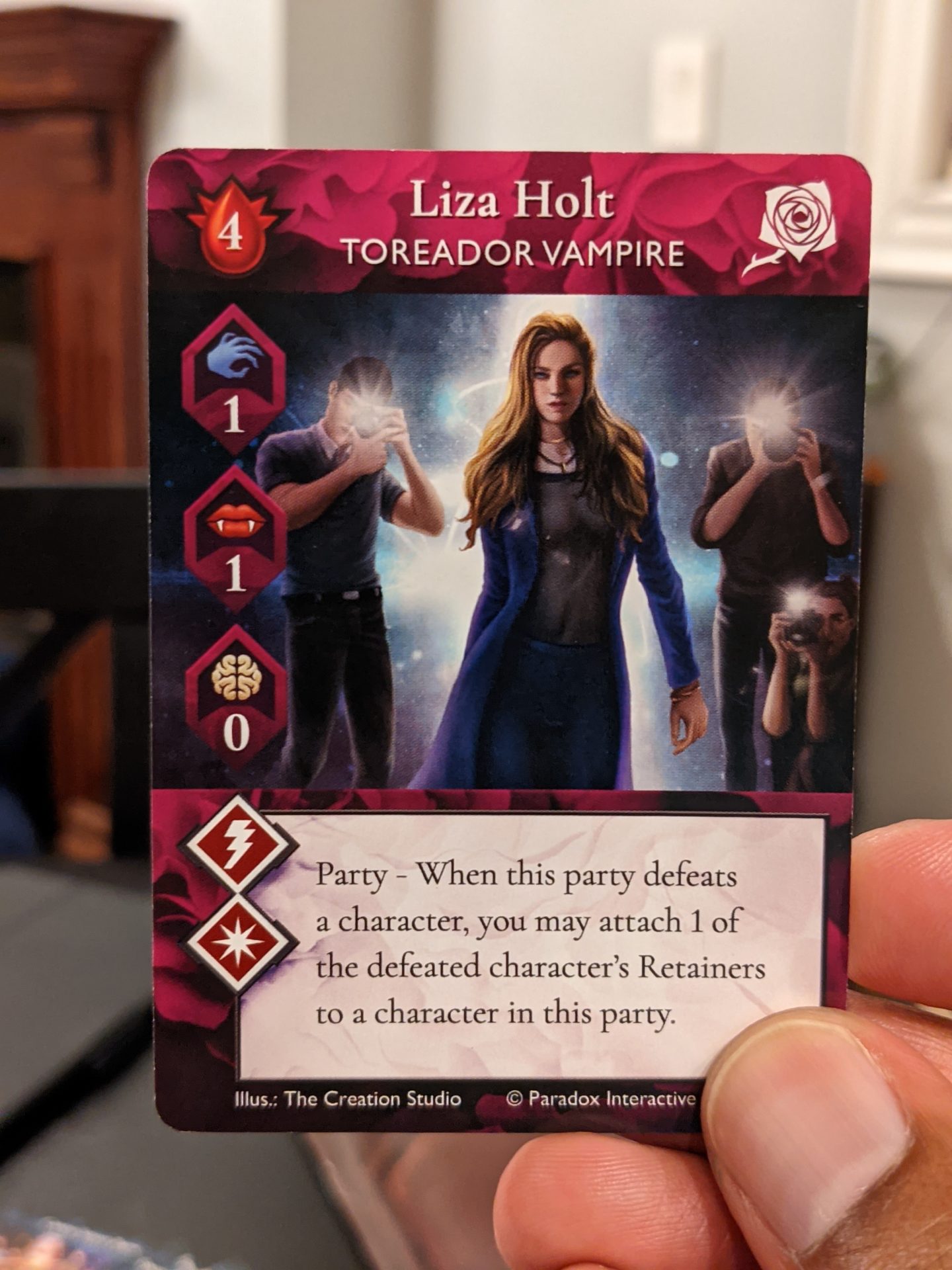
Let’s Talk About the Rules* (with a LOT of Exceptions!)
To prep for my first play of Vampire: The Masquerade—Rivals Expandable Card Game (yes, that is the full title, but for the remainder of this review we’ll go with Vampire: The Masquerade—Rivals), I watched the short 10-minute how to play video produced by Renegade. Watching the video gave me a great vibe: this game is really straightforward! I’ll be able to get this to the table in just a few minutes!
Hold your horses, partner!
Vampire: The Masquerade—Rivals comes with four decks of cards which align with the four vampire factions in the game: Ventrue, Toreador, Malkavian and Brujah. These decks align with two different styles: pure combat (Brujah and Toreador) and a mix of combat and political/non-confrontational subterfuge (Malkavian and Ventrue). Now that I’ve played a few games, I wish Vampire: The Masquerade—Rivals came with four brawling decks instead of only two, because my interest in a more confrontational battle system is much stronger than playing politics. This is important because of how the game plays.
The goal of Vampire: The Masquerade—Rivals is to win by achieving one of three conditions:
- Score 13 “Agenda” (points) before your rivals can.
- Knock out your rival’s “coterie” (collection) of vampires; rivals are determined at the start of play based on a public draw of rival tokens (but in a 2-player game, the rival is simply the other player)
- If any player runs out of Prestige, that player is immediately disqualified from the game. Whichever other player has the most Agenda at this point is deemed the winner.
Each player starts the game with 20 Prestige. This doubles as Blood when flipped over, so really, each player starts with both 20 Prestige and/or Blood. To start the game all players must draw one vampire as their Leader from their Faction Deck, placing Blood on that vampire equal to its Blood Potency (BP), or total health.
For example, if your starting vampire has 5 BP, you take 5 of your Prestige and flip it over to its Blood side, placing those tokens on that starting vampire; this leaves you with 15 Prestige and 5 Blood on your active vampire. Recruiting new vampires spends some of your Prestige, but players always need vampires…if all of a player’s vampires are knocked out, that player’s loss triggers the endgame conditions above.
The basics of player turns in Vampire: The Masquerade—Rivals are very simple. On your turn, each player must reveal a new event, applicable to all players; that event might provide a temporary change to the rules, neutral enemies which must be dealt with by any player, or even random citizens who enter the Streets—the main gameplay area—to provide feeding opportunities for each faction in play. After revealing an event, players get two actions to recruit vampires into their coterie, use action cards, fight other players, or draw additional cards into their hand. Clean-up steps are also straightforward: deal with neutral parties in the Streets, draw cards and potentially let wounded vampires slowly heal up to get themselves back into the fight.
But this being a modern-day board game, there are many, many more rules in Vampire: The Masquerade—Rivals. The easiest thing to initiate are battles against citizens in the Streets or other players; after naming the target and the vampire character attributes you are using in your attack (physical, ranged, social or mental), you get to add one face-down card from your hand to add statistical attributes to your attack, and if you deal more damage than the target can defend, you deal that difference in Blood to your target. It can take a while to drop another player’s vampire to zero BP, and because you generally don’t score Agenda points against any player except for your rival, you won’t spend much time attacking other targets.
There are other ways to score Agenda, thankfully. Each player has an Agenda card which details their personal mission for that game (these are not specific to any one faction, and there are a few extra Agenda cards in the base game); in addition to scoring 2 Agenda each time you knock out a rival vampire, there may be other ways for you to score Agenda. Some of the citizens that you feed on in the Streets will give you points, and when you defeat the neutral faction’s police forces (the Special Affairs Division, or S.A.D.), you’ll also score Agenda.
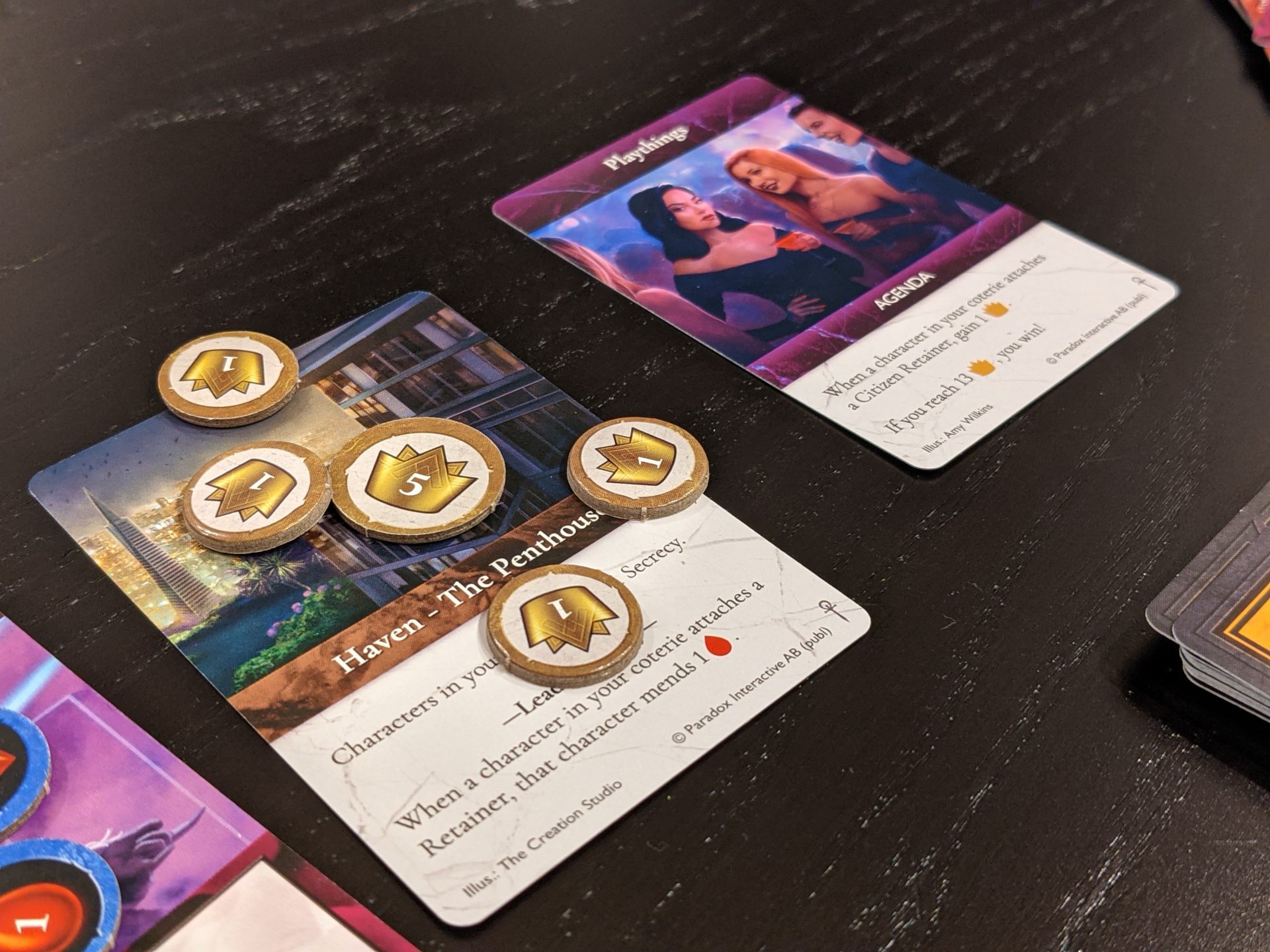
So Far, This Sounds Easy!
This is where things get interesting in Vampire: The Masquerade—Rivals. You could spend your game punching other vampires and feasting on locals in San Francisco, and probably find a way to carve out 13 points before the other players. (I did just that in one game, focusing solely on scoring one or two points every turn.)
However, you can only do that if you are one of the combat-focused factions, Brujah and Toreador. If you are one of the more slithery factions, Malkavian for example, you will likely never be strong enough to do damage regularly to a combat-focused faction because they will be too good at defending against your weak attack power.
That’s where making deals comes in. With cards like Scheme, Conspiracies, Titles and other sneaky ways to build up Prestige and/or trigger special abilities, Vampire: The Masquerade—Rivals has plenty of ways for you to score Agenda and potentially win the game. The question that came up most often with my group, though?
“Why would I want to win a game like this in that way?”
This might be unique to my game group, but in games of MTG, Pokemon or the Marvel Champions series, is there a process to win by having, say, Iron Man negotiate a peace treaty with Black Panther? Or is there a way for Pikachu to plot against another player at the table to hold their points hostage unless they agree to your rules of engagement, which really only benefit you?
I’m guessing that for the most part, you are playing cards in those games to punch your opponent right in the nose. And I like that idea; Vampire: The Masquerade—Rivals does have that as an option if you play as the Brujah and Toreador factions, but not if you mix in other factions in the base game.
Now, I’ll give credit here to Renegade and the game’s design team for throwing a wrench into how these games normally flow. Maybe some players want to be able to settle differences through negotiation or dirty tricks. I think Vampire: The Masquerade—Rivals would shine brightly if all of the factions in the game worked in the shadows and behind the scenes better than fighting it out in the Streets.
But even if there were more non-combat factions available, the rules in Vampire: The Masquerade—Rivals are a major deterrent.
Everything is just too complex in this game for the payoff. A BGG user created a player aid for Vampire: The Masquerade—Rivals which I think is pretty good; that player aid is SEVEN PAGES LONG. And I think it’s the right length because there are so many questions that will arise during a normal playthrough, especially when using all four base game factions.
Combat is supposed to be quick, but when you read the player aid you realize that it’s not as simple as “play X card, deal Y damage.” Schemes are so difficult to explain that even the instruction manual advises the player to read up on that section before choosing the faction. And the sheer number of basic words in Vampire: The Masquerade—Rivals that need full clarity—words as simple as “party”, “influence”, and “character”—is shocking. Even in our third game of Vampire: The Masquerade—Rivals, we were still checking the rules on how parties are formed, how they are broken, what happens when exhausted vampire cards are a part of a party but then another player attacks, etc.
None of this is difficult on its own, but having to constantly check a rules reference gets in the way of why I play games in the first place: fun! I mostly played this game with the same three other players to ensure we always played at a full count, but I did play this game once with my wife, a person who admittedly doesn’t enjoy the idea of going mano-y-mano with her spouse.
“I’m not sure about this one; it just isn’t that much fun to go through the motions here,” she began after her only experience. “And I didn’t like having to take out your people to score!” (Confrontational games don’t work as well for her as a classic Euro.)
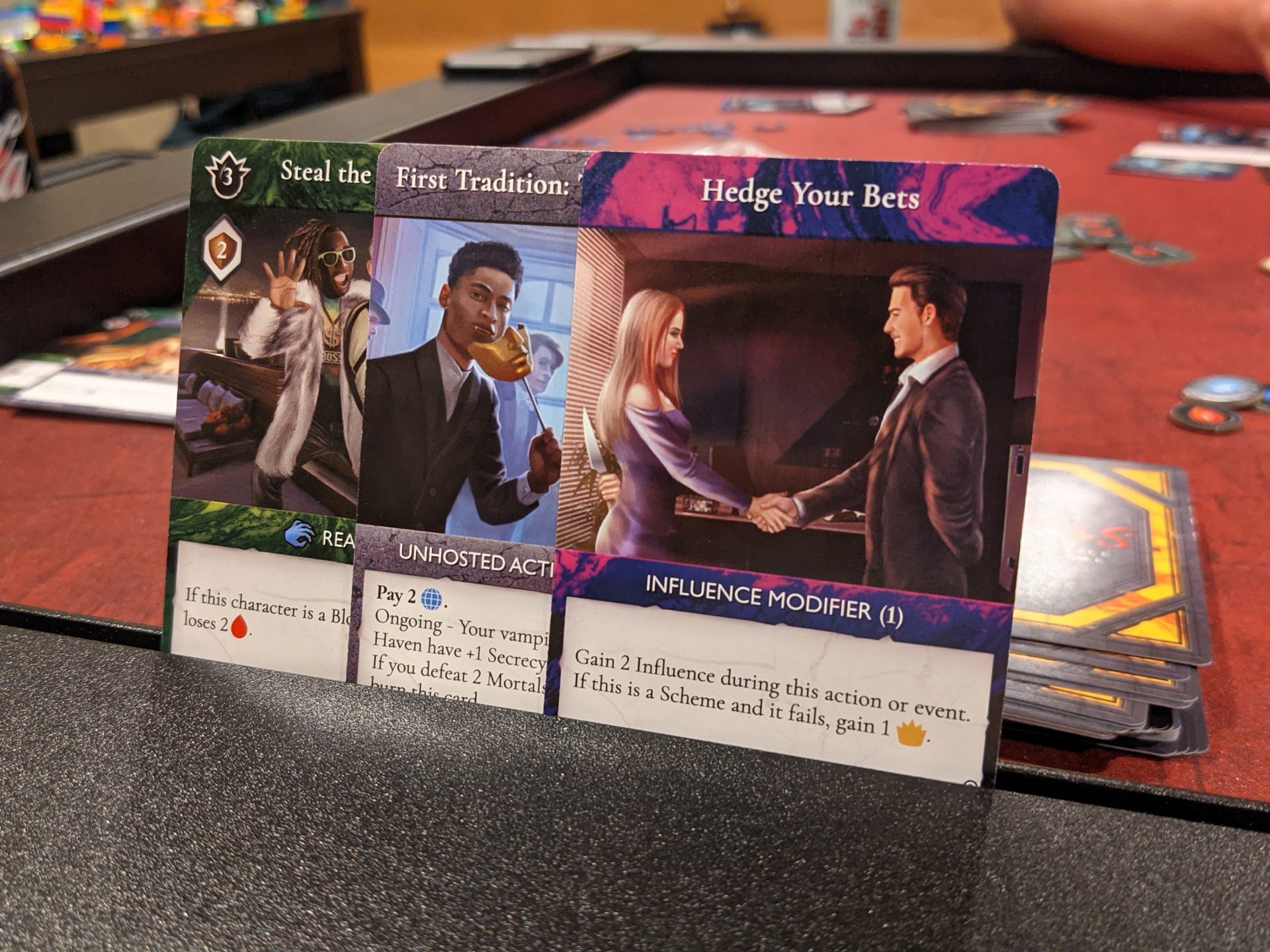
A Quick Note About Additional Cards
The base game of Vampire: The Masquerade—Rivals comes with approximately 60 additional cards, shrink-wrapped with a warning to not open it until you’ve played a couple of games. This extra deck features more Agenda cards, additional vampires for each faction, lots of additional action cards, and the like. While the decks for each faction are pre-arranged, you are welcome to build decks from scratch that accommodate your specific playstyle.
For our final game of Vampire: The Masquerade—Rivals, we decided to break out the new cards and build our own decks, using the rules in the book for building proper decks. Then we made one change: we shuffled the old and new Agenda cards and dealt out one at random to each player.
This was a minor disaster, as one of our four players built a very combat-focused deck, then drew an Agenda card that gave extra Agenda points as a reward for more politically-focused tactics (i.e., a complete mismatch). In the future I will build decks the way the instructions describe, but then allow players to draft Agenda cards to have more control over their destiny. Custom decks also allow you to mix and match vampire factions, which is much more interesting to ensure that you have some vampires better at combat and some better at subterfuge.
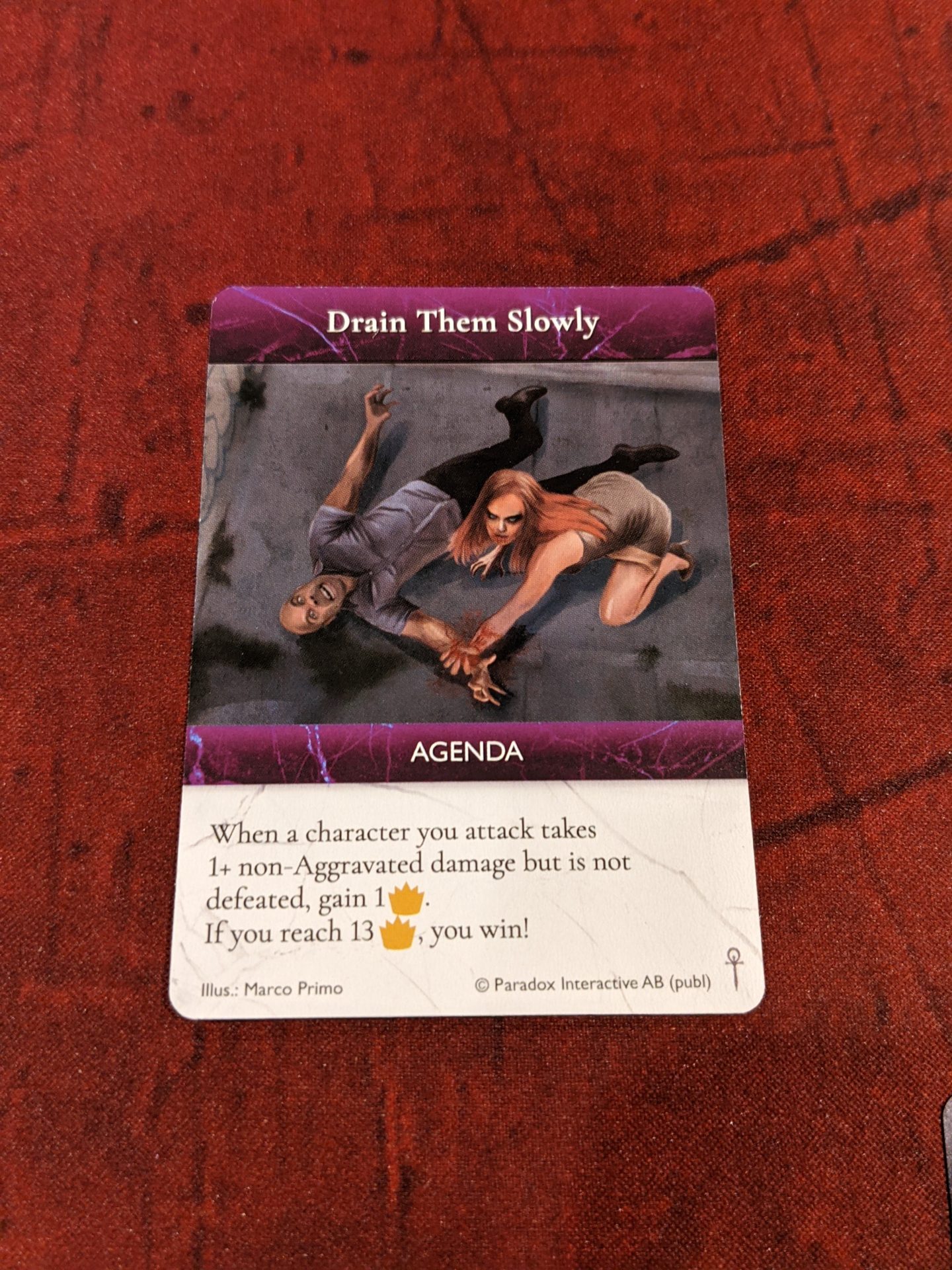
Final Thoughts
Although I’ll admit to being a fan of Renegade products (particularly the Clank! series, some of the West Kingdom games, and Honshu, among many others), I’m surprised that I am left with a feeling of mediocrity with Vampire: The Masquerade—Rivals.
The variability in playstyles is there, but the experience feels more like an exercise than true excitement. The artwork here and overall production? Just fine. You can get through even a four-player game in under 90 minutes and that feels right for what’s happening here. If you have a group willing to push on the more interactive elements of the game, particularly around the advanced faction abilities (Conspiracies and Schemes), you’ll have a more enjoyable time, but the fun factor here is still muted.
Even after building the perfect deck to match your playstyle, you’ll want to continue adding new decks as they are released to keep the gameplay fresh. I’m confident players investing in any expandable card game series are comfortable with what that entails; this also means that while I think the base game is only average, expansions will really up the gameplay options in Vampire: The Masquerade—Rivals for a richer experience.


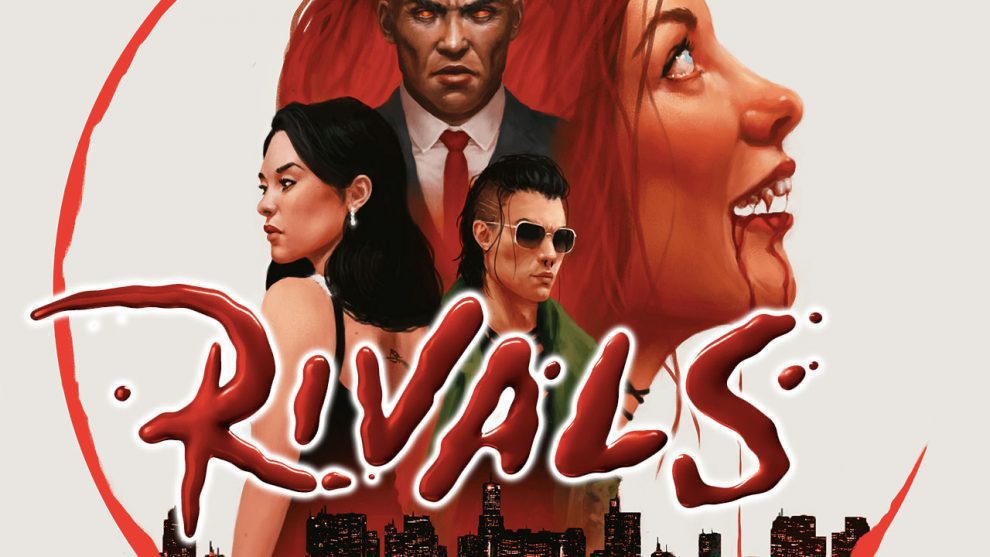


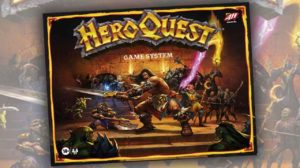
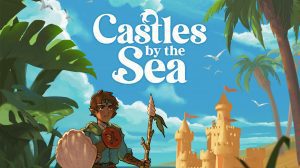
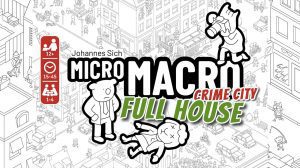




As someone who played Jyhad/Vampire the Eternal Struggle back in the day, Rivals is a newer, more streamlined type of game. Each faction plays differently and you can deck build to negotiate and deal or fight or both. I think reviewing a game like this needs to be done after dozens of plays. I couldn’t imagine reviewing Magic the gathering before I had played it a ton of times and started expanding the game.
I do think the rules are a bit of a mess, but once you get past it the game is fun. They have released one expansion and have a second coming soon.